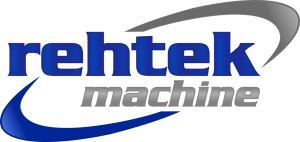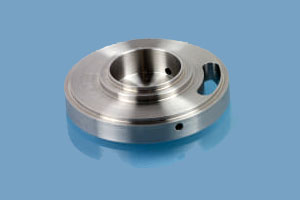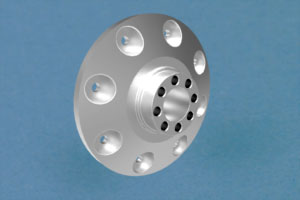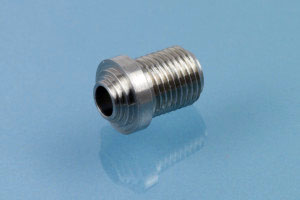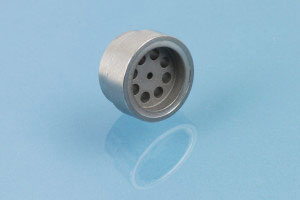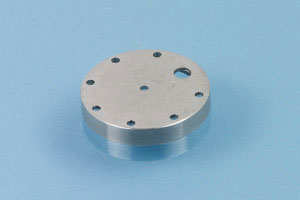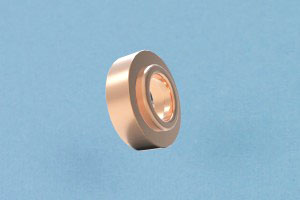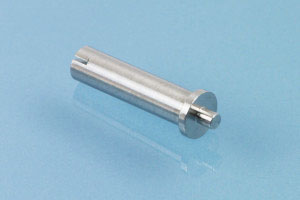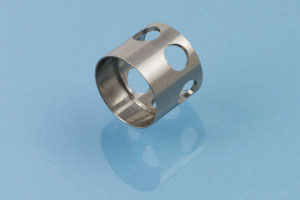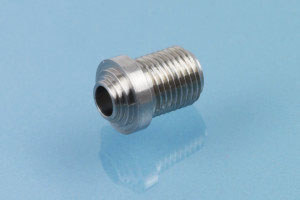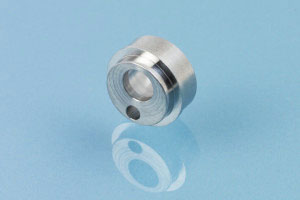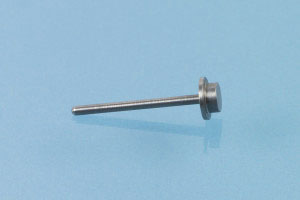Materials
WE SPECIALIZE IN MACHINING AEROSPACE ALLOYS, ALUMINUM, COPPER, INCONEL, KOVAR , STAINLESS STEEL & TITANIUM
Rehtek is the Engineer’s Choice for precision parts machined from metals and alloys, Aluminum to Titanium. We partner with our Raw Material Vendors that supply only DFAR’s compliant material. We know what metals and alloys are better suited for thin walls and optimal machining cycle time. We continually monitor our machining process and add to our machining services. We want our customers to have the best value for their dollar and we provide this through experience and expertise.
If you are unsure of which material is best for your part, the experts at Rehtek can help you determine the best materials to meet the specifications and performance of your precision part.

STAINLESS STEEL
An austenitic chromium-nickel stainless steel containing molybdenum which increases general corrosion resistance improves resistance to pitting from chloride ion solutions, and provides increased strength at elevated temperatures. Stainless 316 is similar to 304 except that this alloy is somewhat stronger at elevated temperatures. Applications include exhaust manifolds, furnace parts, heat exchangers, jet engine parts, pharmaceutical and photographic equipment, valve and pump trim, chemical equipment, tanks, evaporators, pulp, paper and textile processing equipment, parts exposed to marine atmospheres and tubing.
303 contains added phosphorus and sulfur for better machining characteristics. Corrosion resistance is slightly less than 302/304.
304 (18-8) is an austenitic steel possessing a minimum of 18% chromium and 8% nickel, combined with a maximum of 0.08% carbon. It is a nonmagnetic steel which cannot be hardened by heat treatment, but instead. must be cold worked to obtain higher tensile strengths. Type 304 is especially suited for all types of dairy equipment – milking machines, containers, homogenizers, sterilizers, and storage and hauling tanks, including piping, valves, milk trucks and railroad cars.
316L is also austenitic, non-magnetic, and thermally nonhardenable stainless steel like Type 304. The carbon content is held to 0.08% maximum, while the nickel content is increased slightly. What distinguishes Type 316 from Type 304 is the addition of molybdenum up to a maximum of 3%. Molybdenum increases the corrosion resistance of this chromium-nickel alloy to withstand attack by many industrial chemicals and solvents, and, in particular, inhibits pitting caused by chlorides. As such, molybdenum is one of the single most useful alloying additives in the fight against corrosion.
ALUMINUM
Aluminum, its low cost, light-weight, and modern appearance is among the primary reasons for its widespread use. It is non-sparking, electrically conductive, thermally conductive, non-magnetic, reflective, and chemically resistant. It is popular in the construction, marine, and aircraft industries because of its ease of fabrication, non-toxicity, strength (pound-for pound), and resistance to the corrosive atmospheres of industry and marine environments. Anodizing increases this corrosion resistance and also permits iridescent finishes in different colors.
2024 Possessing both high strength and great fatigue resistance, finds excellent usage in parts and structures where a high strength-to-weight ratio is desirable. It is a heat treatable alloy, and use in this condition is recommended. Its workability is good, and it may easily be machined to high finishes.
6061 Combines most of the good qualities of aluminum. It possesses high strength, high resistance to corrosion, good workability, and a wide range of mechanical properties. It is the least expensive and most versatile of the heat treatable alloys.
7075 The addition of a higher percentage of zinc to this alloy makes 7075 one of the highest strength and hardest alloys available. It finds its most common use in the aircraft industry, especially where highly stressed parts are used. 7075 finds the greatest utilization where extreme high strength is required, especially in the aircraft industry. The addition of a higher percentage of zinc to this alloy makes 7075 one of the highest strength and hardest alloys available. It finds its most common use in the aircraft industry, especially where highly stressed parts are used. 7075’s best utilization is where extreme high strength is required, especially in the aircraft industry.
INCONEL
A nickel-chromium alloy that contains molybdenum and niobium which gives the alloy strength through a stiffening effect on the matrix. It is used for its high strength, excellent fabricability, and outstanding corrosion resistance. It is an excellent choice for sea-water applications such as wire rope for mooring cables, propeller blades for motor patrol gunboats, submarine auxiliary propulsion motors, submarine quick disconnect fittings, exhaust ducts for Navy utility boats, sheathing for undersea communication cables, submarine transducer controls, and steam-line bellows. Other applications include springs, seals, bellows for submerged controls, electrical cable connectors, fasteners, flexure devices, and oceanographic instrument components.
KOVAR
Kovar, also known as ASTM F 15 Alloy, is a controlled expansion alloy that is typically applied to high integrity glass and ceramic to metal seals, lids, lead frames and electronic package base. Widely used in the hermetic seal industry. We specialize in machining kovar.
An iron-nickel-cobalt ferrous alloy that has a thermal expansion similar to glass which makes it reliable for glass-to-metal seal applications. Kovar bonds to glass through the intermediate oxide layer of nickel (II) oxide and cobalt (II) oxide. Kovar has application in power tubes, microwave tubes, transistors and diodes, and integrated circuits.
TITANIUM
Grade 5 titanium is the most commonly used titanium alloy that is composed of titanium mixed mainly with aluminum and vanadium. It is significantly stronger than commercial pure titanium with the same stiffness and thermal properties. This grade is an excellent combination of strength, corrosion resistance, weld, and fabricability. Titanium’s uses span many aerospace airframe, engine component uses, and also major non-aerospace applications in the marine, offshore and power generation industries.
COPPER
A soft, malleable, and ductile metal with very high thermal and electrical conductivity. Copper’s high thermal and electrical conductivity allows it to be used in applications that involve conduction of heat and electricity. Electrical applications include use in wiring and motors and copper is used widely in industrial machinery such as in heat exchangers.
CDA 101 and OFE is a very popular grade that we machine.
MONEL
A nickel-copper alloy with high strength and toughness over a wide temperature range and excellent resistance to many corrosive environments. Monel is used in many fields, especially marine and chemical processing. Applications of Monel are valves, pumps, propeller shafts, marine fixtures, fasteners, electrical and electronic components, chemical processing equipment, springs, gasoline and fresh water tanks, crude petroleum stills, process vessels and piping, boiler feedwater heaters, and deaerating heaters.
HASTELLOY
The primary function of the Hastelloy super alloys is that of effective survival under high-temperature, high-stress service in a moderately to severely corrosive, and/or erosion-prone environment where more common and less expensive iron-based alloys would fail, including the pressure vessels of some nuclear reactors, chemical reactors, distillation equipment, and pipes and valves in chemical industry. The predominant alloying ingredient is typically the transition metal nickel. Other alloying ingredients are added to nickel in each of the subcategories of this trademark designation and include varying percentages of the elements molybdenum, chromium, cobalt, iron, copper, manganese, titanium, zirconium, aluminum, carbon, and tungsten. a super alloy, Hastelloy does experience degradation due to fabricating and handling. Electropolishing or passivation of Hastelloy can improve corrosion resistance.
NICKEL
Nickel 600 is corrosion and heat resistant. Some of its applications include vegetable vessels, phenol condensers, mufflers, and furnace trays. Aside from being used in the aerospace industry, it’s used extensively in the chemical industry. Nickel 600 is reliable in standing up to chlorine ion stress corrosion cracking and ammonia, just to name two characteristics.
INVAR
Alloy 36 (Invar 36), is a low expansion alloy that gets its name from “invariable” because it will not react to thermal expansion. Alloy 36 (Invar 36) is most commonly used in applications that require minimum thermal expansion and high dimensional stability.
These characteristics make Alloy 36 (Invar 36) material particularly important to the aircraft & aerospace industry, military and defense, telecommunications industry, machine shops and alloys used to make tools for the solar industry to make solar panels. Leveling rods made of Alloy 36 (Invar 36) are also used in land surveying for high precision elevation leveling.
ALLOY 42/52
42 Alloy, a low expansion alloy, is very similar to Invar 36 with a slightly different Coefficient of Thermal Expansion. This nickel-iron alloy is ideal for lid, lead frames, stencil/etching, telecommunications and aircraft industry, offering a more affordable alternative to Kovar when a tight seal is not required.
42 Alloy has a virtually constant low rate of thermal expansion at temperatures up to approximately 650°F (343°C). Easily machined and formed hot or cold, 42 Alloy is also used extensively in the medical, electronics and automotive industries
Alloy 52 – a controlled expansion alloy has low thermal expansion properties. It’s commonly used in the telecommunications industry in a variety of electronic applications. Alloy 52 is made 52 percent of nickel and 48 percent of iron. It’s more durable than nickel by itself. Produced with good machining properties, it’s manufactured in a controlled environment under controlled conditions.
